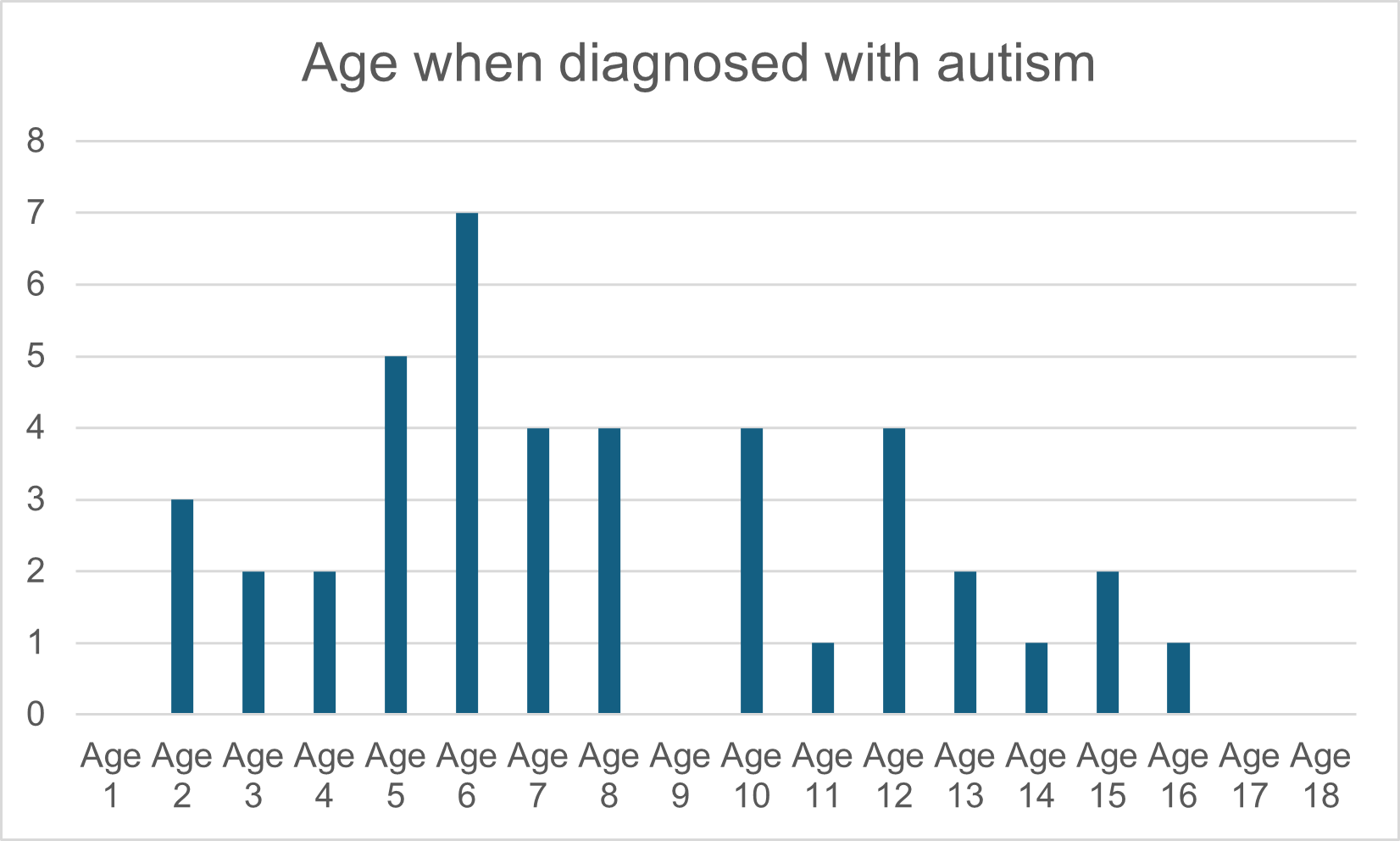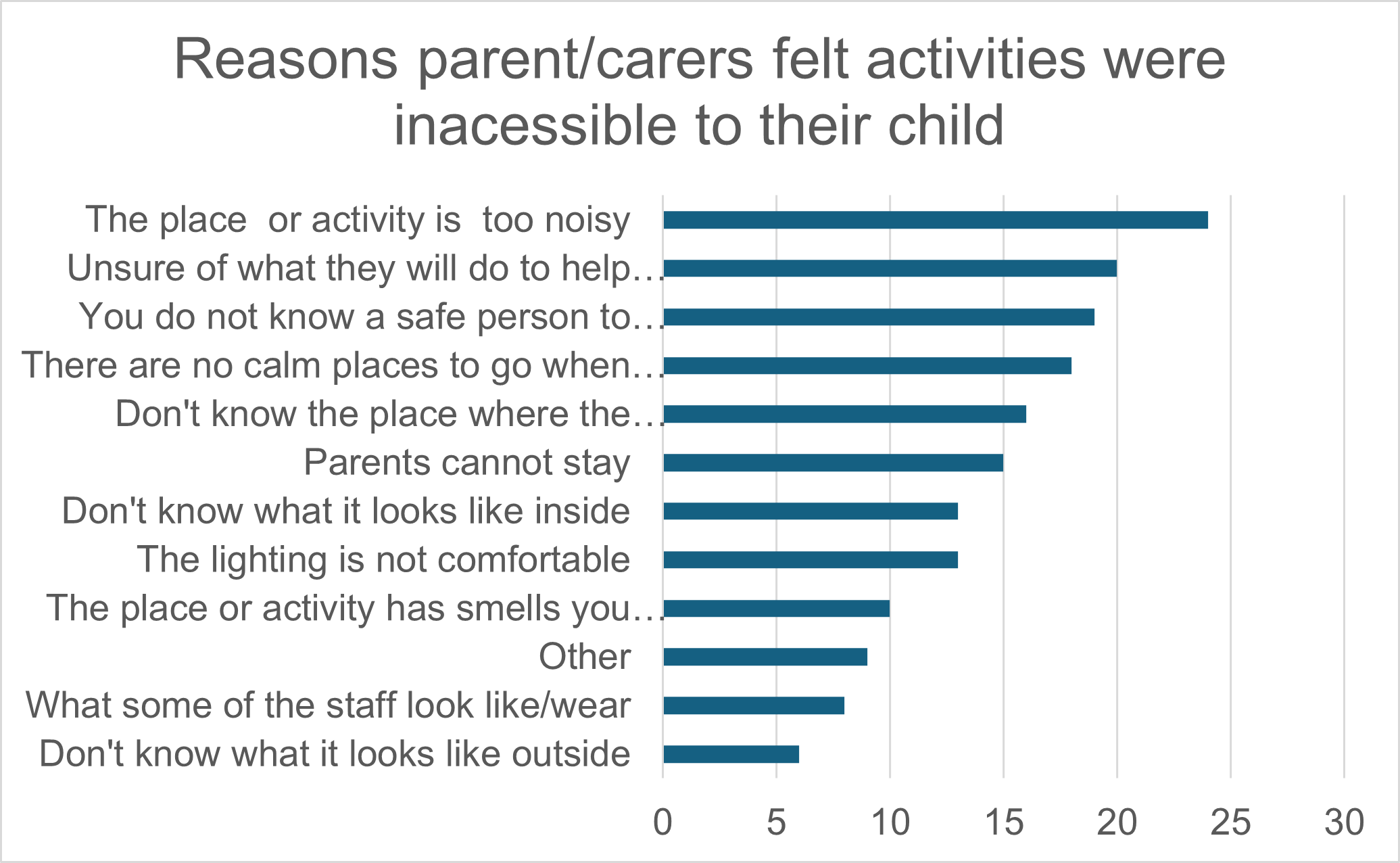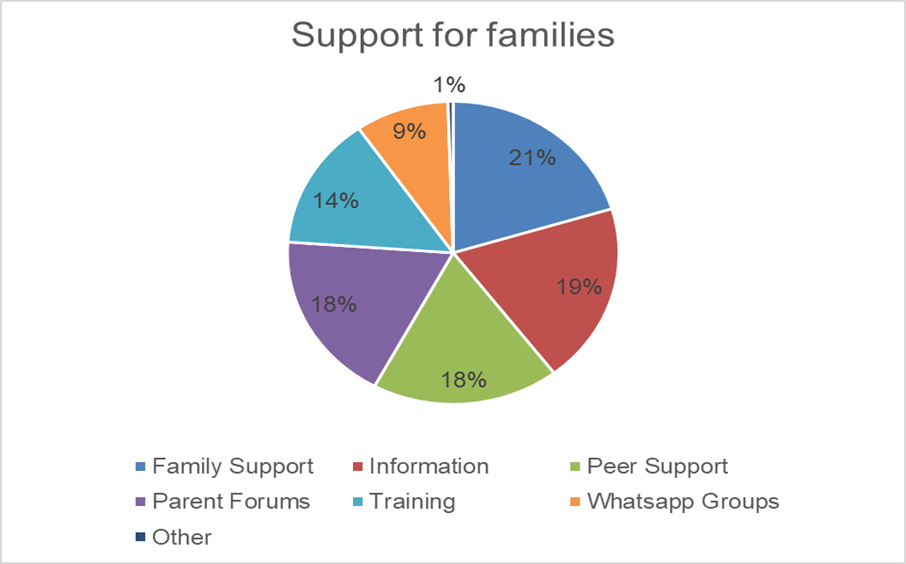There were 42 validated surveys. Parent and carers were aged between 25 to 54.
5 parent and carers are autistic, as well as having an autistic child or young person.
About the children and young people:
- 25 parent and carers have 1 autistic child or young person in their household
- 16 have 2 autistic children or young people in their household
- 1 has 3 autistic children or young people in their household
- 19 p parent and carers have children aged 5 to 11 in their household
- 23 parent and carers have children or young people aged 12 to 18 in their household
- 62% of these children or young people are male
- most are from white or mixed ethnic backgrounds (1 responded 'prefer not to say')
What we asked
What difference did getting an autism diagnosis make to their child?
74% of parent and carers said it made a difference to their child or young person to know they had autism.
Of that 74%:
- most said it made their child or young person understand themselves better
- 5 people said it didn't make their child or young person understand themselves better
- 3 people said it made their child or young person feel less confident knowing they are autistic

How do you think you child is doing in school?
60% of parent and carers think their child's school doesn't understand autistic individuals. Most people thought more training would help their child's school learn about autistic individuals.
Parent and carers felt there was a cookie cutter approach to autism and there needed to be an increased understanding of the variety of ways autism presents and work with parents to understand their child’s individual needs and develop accommodations and aids together.
What does your child enjoying outside of school?
Swimming, art and craft and going to the park were the top 3 things their children enjoyed doing after school.
45% of parents said that their child belonged to a club or group:
- Chance to Dance, swimming, and gymnastics/ninja skills was selected 3 times
- Kidz and football was selected twice
- Guides and Scouts was selected once.
Other clubs or groups attended by children and young people with autism include:
- Autism Berkshire Trampolining at Bracknell Trampoline Centre
- Afterschool Music Club
- Child Development Centre, Great Hollands
- Dance Cheerleading
- Make/Sense Theatre
- Artemis Medusa Music Theatre
- Oakwood Rock Climbing Group
- Friendship Makers at GH Library
- Social Groups for Home Educated Children
- 2nd Bracknell Explorers
- Waves Swim and Fitness
- Gymfinity/Ninjas
- FC Bracknell/Harts of Bracknell
- Swim Kids Ascot
100% of parent and carers who named the above clubs and groups their child or young person attends, said it benefited their child or young person to attend these clubs.
"A sense of belonging. She cannot manage school so the sense of routine and belonging from clubs is invaluable."
Benefits included helping to:
- build confidence, teamwork, independence, fitness
- develop social skills
- make friends (particularly with other SEN children and young people)
- develop interests
Parents preferred their children to be in neurodivergent affirming environments that are less busy and noisy environments, with safe spaces, to regulate.
Some children told us they wanted to be supported and to be in clubs with their friends, not necessarily SEN groups.
60% of parent and carers said their child or young person wants to join more activities with other autistic individuals as they believe being with other autistic people is good for their child or young person.
Some autistic children and young people don’t want to be around other autistic individuals. They find it difficult to relate to or get along with people with different presentations of autism to themselves. They have a desire not to be perceived as autistic or ‘different’.
They also find activities and groups available specifically for autistic people don't match their interests.
Barriers to accessing activities included the times that they took place. For example 6pm on a Friday night when their child was tired from a week at school or at dinner or bedtime.
Some of the things parents and carers suggested were:
- activities available at a greater range of times, including afterschool, weekends, and outside normal working hours during the week (this would help with both parents being able to support the child or young person, and attendance from autistic children who go to school)
- arts, crafts, or pottery clubs
- gaming clubs (including game design, coding, and card games or board games)
- clubs or groups that support ambitions towards further education like textiles or design groups
- animal related clubs (particularly for under 13s)
- more clubs where the parents can stay to provide general, or mobility, support
- more groups specifically for SEN children and young people like sensory groups or soft play (particularly for under 5's) with specially trained staff
Noise was the most common reason given as to why an activity would not be accessible to their child/young person.
Other barriers included:
- off peak timings of activities meaning working parents or children in school cannot attend, siblings cannot attend to support
- worries about differing presentations of autism among other attendees and low staff to child ratio
Most parent and carers found out about activities through social media or schools.
"They find it challenging being with other autistic young people, they see their "differences" as odd and cannot identify with them. They do not like to be perceived as SEN or needing anything different to anyone else and, despite being in year 11, cannot see past the extreme presentations of autism."

What is your experience with healthcare professionals?
Parent and carers said most health care professionals should talk to them about their child or young person’s need. Training would help them communicate better with their child or young person. They felt health professionals needed to learn about how an autistic person might describe their symptoms and interpret questions.
Also, healthcare professionals needed to learn about the accommodations they can make in practice to make it more accessible.
74% of parent and carers don't think their doctor understands their autistic child.
71% don't think their nurse or health practitioner understands their autistic child.
62% don't think their dentist understands their autistic child.
Quiet waiting rooms, better lighting, and video consults have been suggested for better experiences in engaging with healthcare professionals and settings. Waiting times can be difficult for children who struggle to wait.
Other challenges
When going somewhere for the first time (such as school, doctor or cinema) children and young people need information beforehand. The top 2 things they need to know are what it looks like inside and calm places to go.
Many parent and carers said their child will need support in making decisions. For example, due to anxiety or needing help understanding options and questions through repetition or rewording or having difficulty expressing their own thoughts and feelings with words.
However, with the right support most thought they would be able to make their own decisions.
What are the avenues of support you receive for yourself and your family?
Parent and carers said family support, but only by a small margin. Information, peer support, and parent forums followed very closely behind.

Some of the barriers to support identified were:
- no suitable support available
- health professionals signposting to already easily accessible or known information
- health professionals focusing on fixing autistic behaviours rather than accommodating them
- support groups inaccessible to working parents because of timings
- being a parent with dyslexia and struggling with written information
- difficulty feeling heard and understood by local authorities
- difficulty getting out and about with children/young people with autism
- long wait lists